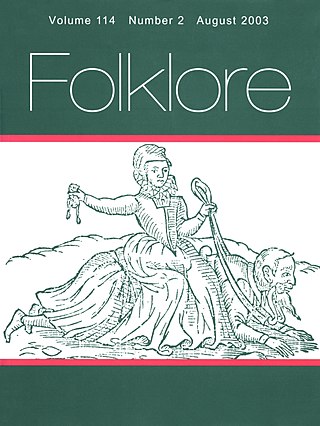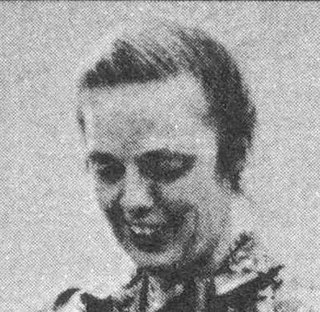Related Research Articles

Folklore studies is the branch of anthropology devoted to the study of folklore. This term, along with its synonyms, gained currency in the 1950s to distinguish the academic study of traditional culture from the folklore artifacts themselves. It became established as a field across both Europe and North America, coordinating with Volkskunde (German), folkeminner (Norwegian), and folkminnen (Swedish), among others.
Alan Jabbour was an American musician and folklorist, and the founding director of the American Folklife Center at the Library of Congress.
Public folklore is the term for the work done by folklorists in public settings in the United States and Canada outside of universities and colleges, such as arts councils, museums, folklife festivals, radio stations, etc., as opposed to academic folklore, which is done within universities and colleges. The term is short for "public sector folklore" and was first used by members of the American Folklore Society in the early 1970s.
Margaret Anne "Peggy" Bulger is a folklorist and served as the director of the American Folklife Center at the Library of Congress from 1999 to 2011, when she moved to Florida to continue work on personal projects.

Simon J. Bronner is an American folklorist, ethnologist, historian, sociologist, educator, college dean, and author.
The Center for Folklife & Cultural Heritage (CFCH) is one of three cultural centers within the Smithsonian Institution in the United States. Its motto is "culture of, by, and for the people", and it aims to encourage understanding and cultural sustainability through research, education, and community engagement. The CFCH contains (numerically) the largest collection in the Smithsonian, but is not fully open to the public. Its budget comes primarily from grants, trust monies, federal government appropriations, and gifts, with a small percentage coming from the main Smithsonian budget.
Henry Glassie College Professor Emeritus at Indiana University Bloomington, has done fieldwork on five continents and written books on the full range of folkloristic interest, from drama, song, and story to craft, art, and architecture. Three of his books -- Passing the Time in Ballymenone, The Spirit of Folk Art, and Turkish Traditional Art Today -- were named among the "Notable Books of the Year" by The New York Times. Glassie has won many awards for his work, including the Charles Homer Haskins Prize of the American Council of Learned Societies for a distinguished career of humanistic scholarship. A film on his work, directed by Pat Collins and titled Henry Glassie: Field Work, had its world premiere at the Toronto International Film Festival in 2019.

Bess Lomax Hawes was an American folk musician, folklorist, and researcher. She was the daughter of John Avery Lomax and Bess Bauman-Brown Lomax, and the sister of Alan Lomax and John Lomax Jr.

Richard Kurin, an American cultural anthropologist, museum official and author, is the Acting Provost and Under Secretary for Museums and Research at the Smithsonian Institution. He is a key member of the senior team managing the world's largest museum and research complex with 6,500 employees and a $1.4 billion annual budget, caring for more than 139 million specimens, artifacts and artworks, working in 145 countries around the globe, hosting some 30 million visitors a year, and reaching hundreds of millions online and through the Smithsonian's educational programs and media outreach. Kurin is particularly responsible for all of the national museums, scholarly and scientific research centers, and programs spanning science, history, art and culture.
W.K. McNeil was a prominent American folklorist, historian, record producer, and author specializing in Ozark and Appalachian mountain cultures.
Dorothy Noyes is an American folklorist and ethnologist whose comparative, ethnographic and historical research focuses on European societies and upon European immigrant communities in the United States. Beyond its area studies context, her work has aimed to enrich the conceptual toolkit of folklore studies (folkloristics) and ethnology. General problems upon which she has focused attention include the status of "provincial" communities in national and global contexts, heritage policies and politics, problems of innovation and creativity, and the nature of festival specifically and of cultural displays and representations generally.

Margaret R. Yocom is a folklorist and poet. Now emerita, she taught at George Mason University from 1977 to 2013 and founded the Folklore Studies Program there. She works in Maine.
Barbara Kirshenblatt-Gimblett is a scholar of Performance and Jewish Studies and a museum professional. Professor Emerita of Performance Studies at New York University, she is best known for her interdisciplinary contributions to Jewish studies and to the theory and history of museums, tourism, and heritage. She is currently the Ronald S. Lauder Chief Curator of the Core Exhibition and Advisor to the Director at POLIN Museum of the History of Polish Jews in Warsaw.
Michael Atwood Mason is an American folklorist and museum professional. He was CEO and Executive Director of President Lincoln's Cottage. Up to February 2021 he was the Director of the Smithsonian Center for Folklife and Cultural Heritage.
Family folklore is the branch of folkloristics concerned with the study and use of folklore and traditional culture transmitted within an individual family group. This includes craft goods produced by family members or memorabilia that have been saved as reminders of family events. It includes family photos, photo albums, along with bundles of other pages held for posterity such as certificates, letters, journals, notes, and shopping lists. Family sayings and stories which recount true events are retold as a means of maintaining a common family identity. Family customs are performed, modified, sometimes forgotten, created or resurrected with great frequency. Each time the result is to define and solidify the perception of the family as unique.
Museum folklore is a domain of scholarship and professional practice within the field of folklore studies (folkloristics).

Kay Turner is an artist and scholar working across disciplines including performance, writing, music, exhibition curation, and public and academic folklore. She is noted for her feminist writings and performances on subjects such as women’s home altars, fairy tale witches, and historical goddess figures. She co-founded “Girls in the Nose,” a lesbian feminist rock punk band that anticipated riot grrl.
Judith McCulloh was an American folklorist, ethnomusicologist, and university press editor.
C. Kurt Dewhurst is an American curator and folklorist. Dewhurst is Director for Arts and Cultural Partnerships at Michigan State University (MSU) and also a Senior Fellow in University Outreach and Engagement. At MSU, he is also Director Emeritus of the Michigan State University Museum and a Professor of English and Museum Studies.
Rayna Diane Green is an American curator and folklorist. She is Curator Emerita, in the Division of Cultural and Community Life at the National Museum of American History, Smithsonian Institution.
References
- ↑ Tuohy, Sue (Spring 1991). "Remembering Harry Gammerdinger (1956–1990)" (PDF). Traditions: Indiana University Folklore Institute Alumni News. 6 (2). Indiana University Alumni Association: 3.
- 1 2 "Staff". About us. Smithsonian Center for Folklife & Cultural Heritage. Retrieved 2021-05-08.
- ↑ Mee, Evangeline (November 14, 2018). "Featured Folklorist: Betty Belanus (Smithsonian Center for Folklife and Cultural Heritage)". AFS Review. American Folklore Society.
- ↑ Reviews of Caravan to America:
- "Review". Kirkus Reviews . October 15, 2002.
- "Children's Book Review". Publishers Weekly . October 1, 2002.
- Hoaglant, Gina (2003). "Books for children". Childhood Education. 79 (4): 244. doi:10.1080/00094056.2003.10521203. S2CID 219598296.
- Yokota, Junko; Cai, Mingshui; Kubasak, Theresa (May 2003). "Reading corner for children". Language Arts. 80 (5): 396–397. JSTOR 41483344.
- ↑ Burns, Richard Allen (2004). "Review of Seasonal". Journal of American Folklore . 117 (464): 232–233. JSTOR 4137854.
- ↑ Holtzberg, Maggie (February 15, 2018). "Curatorial Conversations: Cultural Representation and the Smithsonian Folklife Festival (Review)". Journal of Folklore Research. Archived from the original on 8 May 2021. Retrieved 8 May 2021.